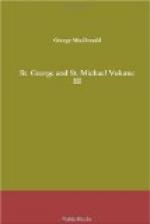But Richard imagined that something in his look had displeased her, and was ashamed, for he had ever been, and ever would be, sensitive as a child to rebuke. Even when it was mistaken or unjust he would always find within him some ground whereon it might have alighted.
‘Forgive me, Dorothy,’ he said, supposing she had found his look presumptuous.
‘Nay, Richard,’ returned Dorothy, with her eyes fast on the ground, whence it seemed rosy mists came rising through her, ’I know no cause wherefore thou shouldst ask me to forgive thee, but I do know, although thou knowest not, good cause wherefore I should ask thee to forgive me. Richard, I will tell thee the truth, and thou wilt tell me again how I might have shunned doing amiss, and how far my lie was an evil thing.’
‘Lie, Dorothy! Thou hast never lied!’
’Hear me, Richard, first, and then judge. Thou rememberest I did tell thee that night as we talked in the field, that I had about me no missives: the word was true, but its purport was false. When I said that, thou didst hold in thy hand my comb, wherein were concealed certain papers in cipher.’
‘Oh thou cunning one!’ cried Richard, half reproachfully, half humorously, but the amusement overtopped the seriousness.
‘My heart did reproach me; but Richard, what was I to do?’
‘Wherefore did thy heart reproach thee, Dorothy?’
‘That I told a falsehood—that I told thee a falsehood, Richard.’
‘Then had it been Upstill, thou wouldst not have minded?’
’Upstill! I would never have told Upstill a falsehood. I would have beaten him first.’
’Then thou didst think it better to tell a falsehood to me than to Upstill?’
‘I would rather sin against thee, an’ it were a sin, Richard. Were it wrong to think I would rather be in thy hands, sin or none, or sin and all, than in those of a mean-spirited knave whom I despised? Besides I might one day, somehow or other, make it up to thee—but I could not to him. But was it sin, Richard?—tell me that. I have thought and thought over the matter until my mind is maze. Thou seest it was my lord marquis’s business, not mine, and thou hadst no right in the matter.’
‘Prithee, Dorothy, ask not me to judge.’
’Art thou then so angry with me that thou will not help me to judge myself aright?’
’Not so, Dorothy, but there is one command in the New Testament for the which I am often more thankful than for any other.’
‘What is that, Richard.’
’Judge not. Prythee, between whom lieth the quarrel, Dorothy? Bethink thee.’
‘Between thee and me, Richard.’
‘No, verily, Dorothy. I accuse thee not.’
Dorothy was silent for a moment, thinking.
‘I see, Richard,’ she said. ’It lieth between me and my own conscience.’
’Then who am I, Dorothy, that I should dare step betwixt thee and thy conscience? God forbid. That were a presumption deserving indeed the pains of hell.’




